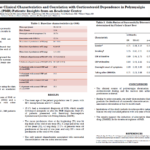An overview of highlights from the 2025 ECIM meeting, including research on treatment options for systemic sclerosis, the management of PMR & autoimmune testing.


An overview of highlights from the 2025 ECIM meeting, including research on treatment options for systemic sclerosis, the management of PMR & autoimmune testing.

Should all patients with polymyalgia rheumatica (PMR) have a vascular ultrasound assessment? What treatments are the safest and most efficacious for patients with PMR? Frank Buttgereit, MD, answered these questions and highlighted the latest research on PMR in this session at EULAR 2024.

A Shift in Prescribing Patterns Safety issues prompt discontinuation of tofacitinib By Stephanie Song, MD, & Joshua F. Baker, MD, MSCE Why was this study done? The ORAL Surveillance study highlighted risks of cardiac events, thromboembolism (VTE) and malignancy associated with use of Janus kinase inhibitors (JAKi). We sought to determine the impact of safety…

As they usually are, the pediatrics are absolutely correct: A child is not just a little adult. The same can be said for the eldest among us: Senior citizens are more than just old adults; they have their own biopsychosocial considerations that we, as rheumatologists, must tend to. Among all the conditions that we find…

Desh Nepal, MD, Sebastian E. Sattui, MD, MS, & Michael Putman, MD, MS |
Originally posted Feb. 13, 2023; reposted in conjunction with publication of the PMR supplement to the February 2024 issue of The Rheumatologist. PHILADELPHIA—Polymyalgia rheumatica (PMR) is a chronic inflammatory condition that almost exclusively affects individuals older than 50.1 First described in 1888, PMR has been a recognized rheumatic disease since at least 1957. Diagnosing the…

In an ACR Convergence 2022 session, Robert Spiera, MD, director of the Scleroderma, Vasculitis, and Myositis Center at the Hospital for Special Surgery, New York City, discussed the use of sarilumab as a potential glucocorticoid-sparing therapy in a phase 3 study in patients with treatment-refractory polymyalgia rheumatica (PMR), one of the most common inflammatory diseases…

On Feb. 28, 2023, the U.S. Food & Drug Administration (FDA) approved sarilumab (Kevzara) for the treatment of adults with polymyalgia rheumatica (PMR) for whom glucocorticoids have proved inadequate or who cannot tolerate a glucocorticoid taper.1,2 Sarilumab is an interleukin (IL) 6 receptor antagonist. In May 2017, the FDA initially approved the agent for the…

Katie Robinson |
Patients with polymyalgia rheumatica (PMR) who had relapsed while tapering glucocorticoid therapy were more likely to achieve sustained remission at one year and have a lower glucocorticoid exposure if they were treated with sarilumab (Kevzara) plus a rapid, 14-week glucocorticoid taper than if they received placebo plus a standard, 52-week glucocorticoid taper. This is according…

Katie Robinson |
A minority of patients with polymyalgia rheumatica (PMR) who were new to rheumatology practice were prescribed steroid-sparing agents through two years of follow-up. This is according to a large, U.S.-based cohort study, published in Arthritis Care & Research, which also found that nearly two-thirds of the patients remained on glucocorticoids beyond one year.1 “Our study…

Vivekanand Tiwari, MD, Emily Campbell, MD, Joshua Skydel, MD, Bryan Savage, MD, Monica Dimambro, Todd MacKenzie, PhD, & William F. Rigby, MD |
Background/Purpose Polymyalgia rheumatica (PMR) treatment is primarily based on long-term corticosteroids, which results in significant toxicities. Studies have shown that patients with PMR are exposed to years of corticosteroid treatment.1,2 In a single academic center cohort, we found that 76% of patients remained on steroids at the end of two years.3 In a second cohort…